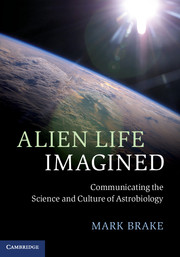Book contents
- Frontmatter
- Contents
- 1 Kosmos: aliens in ancient Greece
- 2 The world turned upside down: Copernicanism and the voyages of discovery
- 3 In Newton’s train: pluralism and the system of the world
- 4 Extraterrestrials in the early machine age
- 5 After Darwin: The War of the Worlds
- 6 Einstein’s sky: life in the new universe
- 7 Ever since SETI: astrobiology in the space age
- Index
- References
1 - Kosmos: aliens in ancient Greece
Published online by Cambridge University Press: 05 December 2012
- Frontmatter
- Contents
- 1 Kosmos: aliens in ancient Greece
- 2 The world turned upside down: Copernicanism and the voyages of discovery
- 3 In Newton’s train: pluralism and the system of the world
- 4 Extraterrestrials in the early machine age
- 5 After Darwin: The War of the Worlds
- 6 Einstein’s sky: life in the new universe
- 7 Ever since SETI: astrobiology in the space age
- Index
- References
Summary
On our way we passed many countries and put in at the Morning Star, which was just being colonised. We landed there and procured water. Going aboard and making for the Zodiac, we passed the Sun to port, hugging the shore. We did not land, though many of my comrades wanted to; for the wind was unfavourable. But we saw that the country was green and fertile and well-watered, and full of untold good things.
Sailing the next night and day we reached Lamp-town toward evening, already being on our downward way. This city lies in the air midway between the Pleiades and the Hyades, though much lower than the Zodiac. On landing, we did not find any men at all, but a lot of lamps running about and loitering in the public square and at the harbour. Some of them were small and poor, so to speak: a few, being great and powerful, were very splendid and conspicuous. Each of them has his own house, or sconce, they have names like men, and we heard them talking. They offered us no harm, but invited us to be their guests. We were afraid, however, and none of us ventured to eat a mouthful or close an eye. They have a public building in the centre of the city, where their magistrate sits all night and calls each of them by name, and whoever does not answer is sentenced to death for deserting. They are executed by being put out. We were at court, saw what went on, and heard the lamps defend themselves and tell why they came late. There I recognised our own lamp: I spoke to him and enquired how things were at home, and he told me all about them.
Lucian, A True Story, trans. A. M. Harmon, parallel English and GreekThe war of the worldviews
Astrobiology has some backstory.
The tale of our changing view of the possibility of life beyond the Earth is one that begins in ancient times, during the grandeur that was the ancient Greek world. In fact, the intellectual and cultural brilliance of the Greeks will have a profound effect on the rest of our narrative. But exactly what historical root does the plurality of worlds debate have in antiquity? What precursors in philosophy and literature, what flights of imaginative phantasy in fact and fiction? And what bearing did these ideas have on the science and culture of ‘astrobiology’ that was to develop over the coming millennia? Such are the questions that this first chapter seeks to address.
- Type
- Chapter
- Information
- Alien Life ImaginedCommunicating the Science and Culture of Astrobiology, pp. 1 - 45Publisher: Cambridge University PressPrint publication year: 2012



